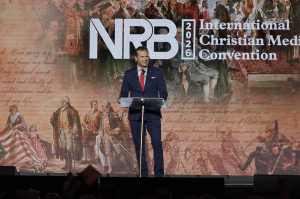Wall Street, Congress, and You
I have said for the past year that much of the financial crisis we are facing stems from moral failure — moral failure on the part of greedy Wall Street speculators, and moral failure on the part of ordinary Americans who bit off more mortgage than they could chew. And all of that is true.
But there is another cause of this crisis that we cannot ignore: the near-incestuous relationship between politicians and big-time government-supported financial institutions.
The near collapse and buyout of Fannie Mae and Freddie Mac are prime examples of Washington corruption. For at least a decade, a few brave politicians have sought to reform these quasi-governmental behemoths, only to be beaten back by political powerbrokers. Why? Because, as they say, money talks.
Few politicians are unsullied. According to Politico.com, Fannie and Freddie spent more than $200 million lobbying Congress over the past decade. Among politicians, Barack Obama ranked number three in terms of campaign contributions received from the two agencies—more than $100,000. His chief advisor in the vice-presidential vetting process is a former CEO of Fannie Mae.
As for John McCain, to his credit, he has called for reform of both corporations. But according to the New York Times, his campaign manager "was paid more than $30,000 a month for five years as president of an advocacy group set up" by Fannie and Freddie "to defend them against stricter regulations."
So what did Fannie and Freddie get for their lobbying efforts? Political cover and huge compensation packages for their executives, like Franklin Raines, who received $91 million over a seven-year period. And they were pushed by House Financial Services Chairman Barney Frank to dive into the incredibly risky sub-prime mortgage business.
Why would Frank and other politicians encourage that? Well, according to a recent Wall Street Journal article, Congressman Frank "pushed through" an "affordable housing" trust fund in the Congress, a fund that "siphons off . . . as much as $500 million a year each" from Fannie and Freddie profits to another "fund that politicians can then disburse to their favorite special interests."
So while the politicians were busy padding their cozy little nests, the chickens have come home to roost, and U. S. taxpayers—you and I—need hip waders.
The first step in the cleanup is a massive $700 billion plan proposed by Treasury Secretary Henry Paulson. The government will buy up bad loans, some of which may be re-sold over time. The plan is necessary to stave off financial collapse.
Of course the people who are going to steer this plan through Congress are the very characters who brought us this crisis. And they are already looking for political and financial goodies they can hang on to the plan.
I've got a better idea. Those who steered Fannie and Freddie into the ground should return to the taxpayers their ridiculous compensation. And if there's criminality involved—either with corrupt executives or elected leaders—then let's have some indictments.



























